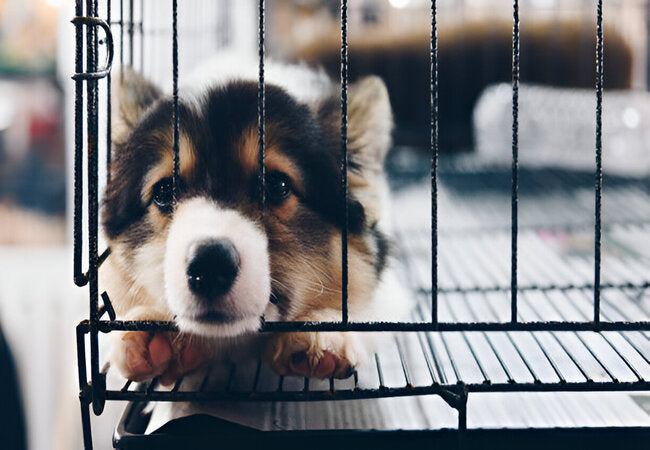2025 Vet Guide: How to Stop Your Puppy Crying in the Crate 🐶😭

In this article
2025 Vet Guide: How to Stop Your Puppy Crying in the Crate 🐶😭
By Dr. Duncan Houston BVSc
Hello! I’m Dr Duncan Houston BVSc, veterinarian and founder of Ask A Vet. Crate training is a vital part of raising a happy, safe pup—but crying in the crate is a challenge many owners face. In this 2025 vet-approved guide, we’ll explore why puppies cry in their crates and how to help them settle, sleep, and learn to love their cozy den. 🐕💤
1. Why Do Puppies Cry in the Crate? 😢
- Separation anxiety: New environments can trigger panic when they’re left alone, especially overnight.
- Lack of crate training: Rushing the process or forcing confinement creates fear instead of comfort.
- Physical needs: Young pups (under 12 weeks) often need to pee or poop every 2–4 hours.
- Loneliness or boredom: Especially in the evening or during long days with no engagement.
2. Is It Okay to Let a Puppy Cry? ⚖️
It depends. Crying at night can be normal—especially for the first 1–3 nights. But prolonged or escalating distress signals your puppy needs support, not punishment.
Ignoring mild whining is okay once you’ve confirmed they’re not hungry, in pain, or needing the toilet. But never ignore frantic, panicked cries, especially in new adoptees.
3. How to Comfort a Crying Puppy in the Crate 💡
3.1 Pre-Crate Rituals
- 🐾 Potty break right before crating
- 💪 Playtime to burn off energy and reduce restlessness
- 🍽️ Meal 60–90 minutes before crate time to avoid accidents or hunger wake-ups
3.2 Create a Cozy Crate Space
- Use a crate cover for darkness and calm
- Add a familiar-smelling blanket or toy (like one from a breeder or shelter)
- Include a heartbeat simulator toy (e.g., Snuggle Puppy)
- Place the crate near you for the first few nights
3.3 Use Calming Aids
Veterinary-approved calming products—like pheromone sprays, supplements, or chews from Purrz—help soothe anxiety. Ask your vet or check recommendations in the Ask A Vet app.
4. Training Steps to Reduce Crying 🧠
Step 1: Make the Crate Positive
- Feed meals in the crate
- Use treats and toys (KONGs!) inside
- Leave the door open at first—let them go in and out freely
Step 2: Practice Short Sessions
- Start with 5–10 minutes, gradually increase
- Stay nearby at first, then step out briefly
- Never use a crate for punishment—keep it positive!
Step 3: Build a Bedtime Routine 🕒
- Same crate time each night
- Soft lighting or a white noise machine nearby
- Nightlight may help in unfamiliar spaces
5. What NOT to Do ❌
- 🚫 Don’t scold or bang the crate—this builds fear, not trust
- 🚫 Don’t crate longer than your puppy’s bladder can handle (1 hr per month of age)
- 🚫 Don’t use the crate only when you leave—build good associations!
6. How Long Does the Crying Last?
Most puppies stop crying within 3–5 nights with proper support. Some may take a couple of weeks, especially rescues. Be consistent, calm, and confident.
7. Special Situations to Watch 🩺
- Separation anxiety: True anxiety needs behavioral intervention and sometimes meds
- Medical issues: UTI, parasites, teething pain—rule out with a vet visit
- Crate aversion: May need to switch to a playpen temporarily
8. Ask A Vet App Can Help 🩺📱
Download the Ask A Vet app for:
- 24/7 vet chat for behavioral advice
- Calming aid recommendations (chews, sprays, toys)
- Step-by-step training plans and milestone tracking
- Product picks from Woopf and Purrz to ease crate transitions
9. FAQs on Crate Crying ❓
- Q: Should I ignore crate whining?
- A: If it’s mild and they’ve had potty/play, yes—but not if it escalates to panic.
- Q: How long can I leave my puppy in the crate?
- A: 1 hour per month of age (e.g., 3 months = 3 hours max).
- Q: Can I use music or sound?
- A: Yes—white noise or soft lullabies reduce anxiety and mask environmental sounds.
10. Final Vet Wisdom 🏁
Crying in the crate is your puppy’s way of saying, “I’m adjusting.” With time, training, and trust, your pup will settle into crate comfort and independence. Use the tips above, lean on the Ask A Vet app for guidance, and give yourself—and your pup—grace during the process. Happy crate training! 🐾💙






